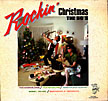 Originally released in 1984 as two separate albums, they were later blended into a single CD called The Best of Cool Yule, but it apparently is no longer in print, though some Amazon merchants claim to have it. Some of the tunes appeared on other Rhino Christmas discs, but overall these are good compilations. The 50s includes Bobby Helms' "Jingle Bell Rock"; Buchanan and Goodman's "Santa and the Satellite" fake-interview recording; The Penguins' "Jingle Jangle"; and Oscar McLollie's "Dig That Crazy Santa Claus." The 60s bring us Bobby "Boris" Pickett's "Monster Mash" sequel, "Monster's Holiday"; Paul Revere and the Raiders with the dated "Wear a Smile at Christmas"; and other 60s semi-legends like the Trashmen, Wailers and Sonics weigh in as well. A dated item that's still a hoot is the Turtles' "Santa and the Sidewalk Surfer." And James Brown's "Let's Make Christmas Mean Something This Year" is here, too.
Originally released in 1984 as two separate albums, they were later blended into a single CD called The Best of Cool Yule, but it apparently is no longer in print, though some Amazon merchants claim to have it. Some of the tunes appeared on other Rhino Christmas discs, but overall these are good compilations. The 50s includes Bobby Helms' "Jingle Bell Rock"; Buchanan and Goodman's "Santa and the Satellite" fake-interview recording; The Penguins' "Jingle Jangle"; and Oscar McLollie's "Dig That Crazy Santa Claus." The 60s bring us Bobby "Boris" Pickett's "Monster Mash" sequel, "Monster's Holiday"; Paul Revere and the Raiders with the dated "Wear a Smile at Christmas"; and other 60s semi-legends like the Trashmen, Wailers and Sonics weigh in as well. A dated item that's still a hoot is the Turtles' "Santa and the Sidewalk Surfer." And James Brown's "Let's Make Christmas Mean Something This Year" is here, too.
June 2008 Archives
 Originally released in 1984 as two separate albums, they were later blended into a single CD called The Best of Cool Yule, but it apparently is no longer in print, though some Amazon merchants claim to have it. Some of the tunes appeared on other Rhino Christmas discs, but overall these are good compilations. The 50s includes Bobby Helms' "Jingle Bell Rock"; Buchanan and Goodman's "Santa and the Satellite" fake-interview recording; The Penguins' "Jingle Jangle"; and Oscar McLollie's "Dig That Crazy Santa Claus." The 60s bring us Bobby "Boris" Pickett's "Monster Mash" sequel, "Monster's Holiday"; Paul Revere and the Raiders with the dated "Wear a Smile at Christmas"; and other 60s semi-legends like the Trashmen, Wailers and Sonics weigh in as well. A dated item that's still a hoot is the Turtles' "Santa and the Sidewalk Surfer." And James Brown's "Let's Make Christmas Mean Something This Year" is here, too.
Originally released in 1984 as two separate albums, they were later blended into a single CD called The Best of Cool Yule, but it apparently is no longer in print, though some Amazon merchants claim to have it. Some of the tunes appeared on other Rhino Christmas discs, but overall these are good compilations. The 50s includes Bobby Helms' "Jingle Bell Rock"; Buchanan and Goodman's "Santa and the Satellite" fake-interview recording; The Penguins' "Jingle Jangle"; and Oscar McLollie's "Dig That Crazy Santa Claus." The 60s bring us Bobby "Boris" Pickett's "Monster Mash" sequel, "Monster's Holiday"; Paul Revere and the Raiders with the dated "Wear a Smile at Christmas"; and other 60s semi-legends like the Trashmen, Wailers and Sonics weigh in as well. A dated item that's still a hoot is the Turtles' "Santa and the Sidewalk Surfer." And James Brown's "Let's Make Christmas Mean Something This Year" is here, too.
 They mean it literally; these doo-wop Christmas songs collected for this 1997 album are all collector's items of some value. The book Merry Christmas Baby lists some of these tunes among the rarest Christmas songs on the market. Many of these tunes were mastered to CD directly from the cleanest vinyl copies the producers could find because in most cases, the original tapes simply don't exist. Some of these turn up on other compilations, like "Christmas in Jail" by the Youngsters and "Rockin' and Rollin' With Santa Claus" by the Hepsters, but a lot of these probably are making their CD debut here. Songs here range from The Robins' 1951 "Have a Merry Xmas" to "The Christmas Spirit" by The Motivations from 1970. The producers give the listener value for money too; there are 27 songs on this CD. I'm partial to "Santa Claus Baby" by The Voices, "Mambo Santa Mambo" by The Enchanters and "All I Want For Christmas Is You" by The C. Quents, but you may have some other favorites. There are two New Year's tunes, "I'll Stay Home New Year's Eve" by The Creators and "New Year's Eve" by The Cameos.
They mean it literally; these doo-wop Christmas songs collected for this 1997 album are all collector's items of some value. The book Merry Christmas Baby lists some of these tunes among the rarest Christmas songs on the market. Many of these tunes were mastered to CD directly from the cleanest vinyl copies the producers could find because in most cases, the original tapes simply don't exist. Some of these turn up on other compilations, like "Christmas in Jail" by the Youngsters and "Rockin' and Rollin' With Santa Claus" by the Hepsters, but a lot of these probably are making their CD debut here. Songs here range from The Robins' 1951 "Have a Merry Xmas" to "The Christmas Spirit" by The Motivations from 1970. The producers give the listener value for money too; there are 27 songs on this CD. I'm partial to "Santa Claus Baby" by The Voices, "Mambo Santa Mambo" by The Enchanters and "All I Want For Christmas Is You" by The C. Quents, but you may have some other favorites. There are two New Year's tunes, "I'll Stay Home New Year's Eve" by The Creators and "New Year's Eve" by The Cameos.
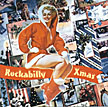 This 2000 compilation is the real deal, original 50s rockabilly Christmas singles, not a single re-creation in the bunch. The liner notes aren't real comprehensive, but they do list the original label and serial number of every one of the 30 songs, along with photographs of some of the actual labels. In some cases, both sides of the same single appear here, like Johnny Preston's "(I Want a) Rock 'n Roll Guitar," which takes off from "Night Before Christmas," and "New Baby For Christmas." If you don't know much about original rockabilly, you'll hear the many influences of rockabilly, some more country, some swing, others more rock, still others pop and novelty records. Not to mention a few borrowed licks from some non-Christmas tunes of the period and a few imitations of more famous artists. The period recording quality and tape hiss on some of these might put off the young'uns, but there are lots of great candidates for a Christmas mix on here. An interesting artifact is the Outlaws' version of "Run Rudolph Run" with a writing credit to Chuck Berry shown on a picture of the original label. "Rock Around the Christmas Tree" by Big Bud is not the familiar song, but it's just as good. The Cadillac fixation lives on with The Four Imperials' "Santa's Got a Coupe de Ville" and Little Joey Farr's "Big White Cadillac." Barry Richards' "Baby Sittin' Santa" and Marlene Paul's "I Wanna Spend Christmas With Elvis" are probably the best-known tunes here. Oldies fans will snarf this up, but everybody's likely to find something they like on this collection. UPDATE: Hey, I just noticed Amazon uses this very post to describe this disc to potential buyers! (I didn't post it there, but at least it's properly credited to this site.)
This 2000 compilation is the real deal, original 50s rockabilly Christmas singles, not a single re-creation in the bunch. The liner notes aren't real comprehensive, but they do list the original label and serial number of every one of the 30 songs, along with photographs of some of the actual labels. In some cases, both sides of the same single appear here, like Johnny Preston's "(I Want a) Rock 'n Roll Guitar," which takes off from "Night Before Christmas," and "New Baby For Christmas." If you don't know much about original rockabilly, you'll hear the many influences of rockabilly, some more country, some swing, others more rock, still others pop and novelty records. Not to mention a few borrowed licks from some non-Christmas tunes of the period and a few imitations of more famous artists. The period recording quality and tape hiss on some of these might put off the young'uns, but there are lots of great candidates for a Christmas mix on here. An interesting artifact is the Outlaws' version of "Run Rudolph Run" with a writing credit to Chuck Berry shown on a picture of the original label. "Rock Around the Christmas Tree" by Big Bud is not the familiar song, but it's just as good. The Cadillac fixation lives on with The Four Imperials' "Santa's Got a Coupe de Ville" and Little Joey Farr's "Big White Cadillac." Barry Richards' "Baby Sittin' Santa" and Marlene Paul's "I Wanna Spend Christmas With Elvis" are probably the best-known tunes here. Oldies fans will snarf this up, but everybody's likely to find something they like on this collection. UPDATE: Hey, I just noticed Amazon uses this very post to describe this disc to potential buyers! (I didn't post it there, but at least it's properly credited to this site.)
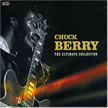 The rock 'n roll answer record to "Rudolph the Red-Nosed Reindeer," it's even co-written by the previous song's author, Johnny Marks, although most people assume Chuck Berry, who recorded it first, wrote it. Possibly they got that idea from early copies of the single that did credit him, and it sure doesn't sound dissimilar to his many other hits. UPDATE: Chuck's name on the original record was intended to obscure Marks' involvement, according to Wikipedia -- working on an R'nB/rock record was considered disreputable in those days. A classic rockin' Christmas record, it's been widely covered in the years since it was written, probably as much for its classic Berry arrangement as for its lyrics, which never seem to go out of style. Originally paired with "Merry Christmas Baby," the 1958 single is Chuck's total contribution to Christmas music and, as history shows, it was more than enough.
The rock 'n roll answer record to "Rudolph the Red-Nosed Reindeer," it's even co-written by the previous song's author, Johnny Marks, although most people assume Chuck Berry, who recorded it first, wrote it. Possibly they got that idea from early copies of the single that did credit him, and it sure doesn't sound dissimilar to his many other hits. UPDATE: Chuck's name on the original record was intended to obscure Marks' involvement, according to Wikipedia -- working on an R'nB/rock record was considered disreputable in those days. A classic rockin' Christmas record, it's been widely covered in the years since it was written, probably as much for its classic Berry arrangement as for its lyrics, which never seem to go out of style. Originally paired with "Merry Christmas Baby," the 1958 single is Chuck's total contribution to Christmas music and, as history shows, it was more than enough.
 This was never released as a single, but is notable for the fact, as reported in the book Merry Christmas Baby by Dave Marsh and Steve Propes, that the composer, Irving Berlin, took it upon himself to call radio stations across the country and demand they not play The Pelvis' version of his treasured song. Few people paid any attention to him although, according to the liner notes of If Every Day Was Like Christmas, one Portland disc jockey was fired for playing it and the whole album was banned in Canada. As noted in the post about the Drifters' version from several years earlier, Elvis used their arrangement, but the original version appears to have escaped Berlin's notice for some reason appropriate to the era. Elvis did release "Blue Christmas" as a single in 1964, however, and "Merry Christmas Baby" in 1971.
This was never released as a single, but is notable for the fact, as reported in the book Merry Christmas Baby by Dave Marsh and Steve Propes, that the composer, Irving Berlin, took it upon himself to call radio stations across the country and demand they not play The Pelvis' version of his treasured song. Few people paid any attention to him although, according to the liner notes of If Every Day Was Like Christmas, one Portland disc jockey was fired for playing it and the whole album was banned in Canada. As noted in the post about the Drifters' version from several years earlier, Elvis used their arrangement, but the original version appears to have escaped Berlin's notice for some reason appropriate to the era. Elvis did release "Blue Christmas" as a single in 1964, however, and "Merry Christmas Baby" in 1971.
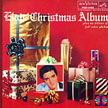 The King never actually charted with a Christmas single, according to the book Rock On, but this LP no doubt did very well on the album charts on its release in 1957. It's been repackaged a number of times since and the track lineup has changed; my budget re-release copy has the standards "Silent Night," "White Christmas," "I'll Be Home For Christmas," "Oh Little Town of Bethlehem," "Here Comes Santa Claus," along with "Blue Christmas," the tough blues "Santa Claus Is Back In Town," the rocking "Santa Bring My Baby Back To Me," and "Mama Liked the Roses." Some of the repackages throw in gospel performances that have nothing to do with Christmas, like "Peace in the Valley." About 1970 or so, he released Elvis Sings the Wonderful World of Christmas, an album with a completely different track lineup, including "Merry Christmas Baby," "The First Noel," "Oh Come All Ye Faithful," "On a Snowy Christmas Night," "It Won't Seem Like Christmas (Without You)," "Silver Bells," and several more, a more serious and lugubrious performance than the original. Both albums remain available today, for download anyway, along with a CD compilation of all his original holiday performances, If Every Day Was Like Christmas, available in a gift box with a fold-out of a snow-covered Graceland. The near-frantic pace of reissues out of the Elvis universe in the past couple of years has resulted in a further number of repackagings of his Christmas repertoire, so a collector could make a mini-specialty of acquiring them all. Christmas Peace, a new 2-disc compilation for 2003, includes one disc of his traditional gospel tunes and one disc of Christmas tunes. UPDATE: Can't leave Elvis without mentioning 2008's Elvis Presley Christmas Duets, in which modern technology makes it possible for a bunch of latter-day female country singers to duet with Elvis. I'm not one to quibble about duetting with dead people; my objection to this collection is that only country singers are duet partners here. Elvis was the king of rock 'n roll; during his lifetime, he wasn't played much on country radio. It's only since his death that he's been considered sympatico with the country realm, to the point that he's being forgotten as a rock icon. Not to mention that some of the duet partners fall pretty short of stature for this exercise -- Carrie Underwood, really? That's about as appropriate as a John Lennon-Justin Bieber recording.
The King never actually charted with a Christmas single, according to the book Rock On, but this LP no doubt did very well on the album charts on its release in 1957. It's been repackaged a number of times since and the track lineup has changed; my budget re-release copy has the standards "Silent Night," "White Christmas," "I'll Be Home For Christmas," "Oh Little Town of Bethlehem," "Here Comes Santa Claus," along with "Blue Christmas," the tough blues "Santa Claus Is Back In Town," the rocking "Santa Bring My Baby Back To Me," and "Mama Liked the Roses." Some of the repackages throw in gospel performances that have nothing to do with Christmas, like "Peace in the Valley." About 1970 or so, he released Elvis Sings the Wonderful World of Christmas, an album with a completely different track lineup, including "Merry Christmas Baby," "The First Noel," "Oh Come All Ye Faithful," "On a Snowy Christmas Night," "It Won't Seem Like Christmas (Without You)," "Silver Bells," and several more, a more serious and lugubrious performance than the original. Both albums remain available today, for download anyway, along with a CD compilation of all his original holiday performances, If Every Day Was Like Christmas, available in a gift box with a fold-out of a snow-covered Graceland. The near-frantic pace of reissues out of the Elvis universe in the past couple of years has resulted in a further number of repackagings of his Christmas repertoire, so a collector could make a mini-specialty of acquiring them all. Christmas Peace, a new 2-disc compilation for 2003, includes one disc of his traditional gospel tunes and one disc of Christmas tunes. UPDATE: Can't leave Elvis without mentioning 2008's Elvis Presley Christmas Duets, in which modern technology makes it possible for a bunch of latter-day female country singers to duet with Elvis. I'm not one to quibble about duetting with dead people; my objection to this collection is that only country singers are duet partners here. Elvis was the king of rock 'n roll; during his lifetime, he wasn't played much on country radio. It's only since his death that he's been considered sympatico with the country realm, to the point that he's being forgotten as a rock icon. Not to mention that some of the duet partners fall pretty short of stature for this exercise -- Carrie Underwood, really? That's about as appropriate as a John Lennon-Justin Bieber recording.
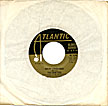 Clyde McPhatter leads the way on this 1954 rendition of the Hollywood classic, the version on which Elvis Presley based his rendition. Which makes it historic on two counts, since this arrangement is the one that got Irving Berlin angry enough to try and get Elvis' version banned. On its own merits, of course, it's wonderful, adding a languid rhythm to a song typically crooned a little too reverently. The flip side is a ballad version of "The Bells of St. Mary's." The Drifters, a later iteration anyway, returned in 1964 with "The Christmas Song," available on Atlantic's Soul Christmas.
Clyde McPhatter leads the way on this 1954 rendition of the Hollywood classic, the version on which Elvis Presley based his rendition. Which makes it historic on two counts, since this arrangement is the one that got Irving Berlin angry enough to try and get Elvis' version banned. On its own merits, of course, it's wonderful, adding a languid rhythm to a song typically crooned a little too reverently. The flip side is a ballad version of "The Bells of St. Mary's." The Drifters, a later iteration anyway, returned in 1964 with "The Christmas Song," available on Atlantic's Soul Christmas.
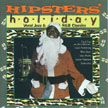 The cover says "Vocal jazz and R'nB classics," and they span a period from 1946 to 1966, a period during which popular vocal dance music began to separate from the jazz realm and cleave to the R'nB and rock genres. Nevertheless, some fairly significant jazz names appear here doing what was essentially the pop music of the time -- Louis Armstrong, Miles Davis, Lionel Hampton, Pearl Bailey, Lena Horne. This 1989 album -- still available for purchase -- features great songs that live up to their titles: "Cool Yule," "Santa Done Got Hip," "Dig That Crazy Santa Claus," and so on. Highlights include Eartha Kitt's original version of "Santa Baby," Big John Greer's "We Wanna See Santa Do the Mambo," Ms. Bailey's request for a "Five Pound Box of Money," and Satchmo himself is represented three times, the best of which is "'Zat You, Santa Claus." Great stuff for when your Christmas party needs a "hip" replacement.
The cover says "Vocal jazz and R'nB classics," and they span a period from 1946 to 1966, a period during which popular vocal dance music began to separate from the jazz realm and cleave to the R'nB and rock genres. Nevertheless, some fairly significant jazz names appear here doing what was essentially the pop music of the time -- Louis Armstrong, Miles Davis, Lionel Hampton, Pearl Bailey, Lena Horne. This 1989 album -- still available for purchase -- features great songs that live up to their titles: "Cool Yule," "Santa Done Got Hip," "Dig That Crazy Santa Claus," and so on. Highlights include Eartha Kitt's original version of "Santa Baby," Big John Greer's "We Wanna See Santa Do the Mambo," Ms. Bailey's request for a "Five Pound Box of Money," and Satchmo himself is represented three times, the best of which is "'Zat You, Santa Claus." Great stuff for when your Christmas party needs a "hip" replacement. 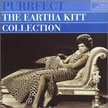 This 1953 record was arguably the Catwoman's greatest hit, and it's a tough one to cover; Madonna's version on A Very Special Christmas is basically an homage, and not many female singers muster the moxie to equal the original. If it's possible for a human being to purr a three-minute record, Eartha did it. The gold-digging sentiments in the song may sound dated, but it wouldn't take much imagination to make them current -- in fact, a number of hip-hop revisitations revel in the opportunity to substitute 21st century bling for Eartha's wishes. Of course, a lot of folks today wouldn't mind having that '54 blue convertible she asks for, especially in showroom condition. Not satisfied with her haul for '53, she recorded a sequel, "This Year's Santa Baby," in which the convertible's a clunker and she wants a private plane, and the yacht's leaking so "hold your breath... I want the Queen Elizabeth." Bob Bailey tips us that Eartha also recorded "Nuttin' For Christmas" and she alters the lyrics to "I'm gettin' nuttin' for Christmas/Cause I didn't want to be bad." He adds, "Guess the approach in 'Santa Baby' didn't work." Ironically, she passed on Christmas Day 2008.
This 1953 record was arguably the Catwoman's greatest hit, and it's a tough one to cover; Madonna's version on A Very Special Christmas is basically an homage, and not many female singers muster the moxie to equal the original. If it's possible for a human being to purr a three-minute record, Eartha did it. The gold-digging sentiments in the song may sound dated, but it wouldn't take much imagination to make them current -- in fact, a number of hip-hop revisitations revel in the opportunity to substitute 21st century bling for Eartha's wishes. Of course, a lot of folks today wouldn't mind having that '54 blue convertible she asks for, especially in showroom condition. Not satisfied with her haul for '53, she recorded a sequel, "This Year's Santa Baby," in which the convertible's a clunker and she wants a private plane, and the yacht's leaking so "hold your breath... I want the Queen Elizabeth." Bob Bailey tips us that Eartha also recorded "Nuttin' For Christmas" and she alters the lyrics to "I'm gettin' nuttin' for Christmas/Cause I didn't want to be bad." He adds, "Guess the approach in 'Santa Baby' didn't work." Ironically, she passed on Christmas Day 2008.
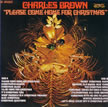 Charles Brown burnishes his reputation as a Christmas bluesman par excellence with this 1961 song. Where "Merry Christmas Baby" was more successful symbolically to the rock 'n roll Christmas movement, "Please Come Home For Christmas" appears to have had more actual sales success for the singer/pianist as a single, eventually earning him a gold record in 1968. Like Brown's earlier song, this one is widely covered; James Brown did a great version, The Eagles did had chart success with a single of this, VH1 wears out the video of Jon Bon Jovi's version from Very Special Christmas 2 and it turns up frequently in the repertories of other blues, soul and rock performers.
Charles Brown burnishes his reputation as a Christmas bluesman par excellence with this 1961 song. Where "Merry Christmas Baby" was more successful symbolically to the rock 'n roll Christmas movement, "Please Come Home For Christmas" appears to have had more actual sales success for the singer/pianist as a single, eventually earning him a gold record in 1968. Like Brown's earlier song, this one is widely covered; James Brown did a great version, The Eagles did had chart success with a single of this, VH1 wears out the video of Jon Bon Jovi's version from Very Special Christmas 2 and it turns up frequently in the repertories of other blues, soul and rock performers.
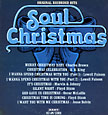 This may be the first rock 'n roll Christmas song. Predating "Jingle Bell Rock," it's more of a blues tune, first done by Charles Brown in 1947 and widely covered by everyone from Elvis Presley to Chuck Berry to Bruce Springsteen to Otis Redding to Southern Culture on the Skids. It's this wide adoption by the rock world that justifies the first sentence of this post. Blues and Christmas seem not to go together, but this one has more of a happy ending. Note that Chuck Berry contemporized it by changing "radio" to "stereo" in the line "I'm feeling fine, got good music on my radio." From Mojo magazine, January 1997: "Brown... was approached by a songwriter named Lou Baxter who tried to sell him a seasonal ditty titled "Merry Christmas Blues." Brown then, allegedly, revamped the song... but listed Baxter's name as composer so that he would get a cut. Brown... recorded it as lead singer with Johnny Moore's Three Blazers and Exclusive Records promptly placed Moore's name on the label." Brown has recorded this several more times since the original performance under his own name. He recorded two Christmas albums in his career, one in 1961 and another in 1993.
This may be the first rock 'n roll Christmas song. Predating "Jingle Bell Rock," it's more of a blues tune, first done by Charles Brown in 1947 and widely covered by everyone from Elvis Presley to Chuck Berry to Bruce Springsteen to Otis Redding to Southern Culture on the Skids. It's this wide adoption by the rock world that justifies the first sentence of this post. Blues and Christmas seem not to go together, but this one has more of a happy ending. Note that Chuck Berry contemporized it by changing "radio" to "stereo" in the line "I'm feeling fine, got good music on my radio." From Mojo magazine, January 1997: "Brown... was approached by a songwriter named Lou Baxter who tried to sell him a seasonal ditty titled "Merry Christmas Blues." Brown then, allegedly, revamped the song... but listed Baxter's name as composer so that he would get a cut. Brown... recorded it as lead singer with Johnny Moore's Three Blazers and Exclusive Records promptly placed Moore's name on the label." Brown has recorded this several more times since the original performance under his own name. He recorded two Christmas albums in his career, one in 1961 and another in 1993.
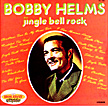 Although many songs mentioned on this site predate it, this 1957 song is probably the first one to cross rock 'n roll with Christmas in an overt way. Ironically, considering this site's reluctance to promote country music, Helms actually was a country singer with a number of Billboard chart hits before this song, and its wild holiday success at the time aligned him with rock 'n roll for all time in the public eye. This isn't as widely covered as a lot of contemporary holiday songs, but it's hardly neglected. Bobby Rydell and Chubby Checker did their own version in 1961, and the Hall and Oates cover was pretty big in its day; it was a 7-inch or 12-inch single between 1983 and 1985 and turns up on compilations from time to time. By the way, Helms' original B-side was "Captain Santa Claus (And His Reindeer Space Patrol)." Helms had several other hits in the 1956-7 time frame, and continued to record through the 1980s. His original "Jingle Bell Rock" even charted at no. 18 in the US adult contemporary charts upon re-release in 1996, a year before his death.
Although many songs mentioned on this site predate it, this 1957 song is probably the first one to cross rock 'n roll with Christmas in an overt way. Ironically, considering this site's reluctance to promote country music, Helms actually was a country singer with a number of Billboard chart hits before this song, and its wild holiday success at the time aligned him with rock 'n roll for all time in the public eye. This isn't as widely covered as a lot of contemporary holiday songs, but it's hardly neglected. Bobby Rydell and Chubby Checker did their own version in 1961, and the Hall and Oates cover was pretty big in its day; it was a 7-inch or 12-inch single between 1983 and 1985 and turns up on compilations from time to time. By the way, Helms' original B-side was "Captain Santa Claus (And His Reindeer Space Patrol)." Helms had several other hits in the 1956-7 time frame, and continued to record through the 1980s. His original "Jingle Bell Rock" even charted at no. 18 in the US adult contemporary charts upon re-release in 1996, a year before his death.
